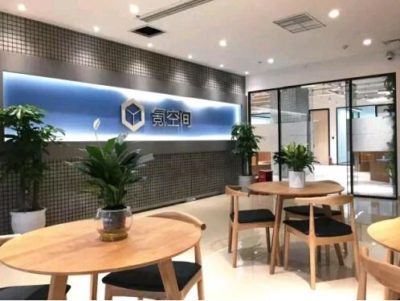
Kr Space is said to be closing down locations
Mainland co-working provider Kr Space, a spinoff of Alibaba-backed tech media firm 36Kr, is said to be closing down six locations, spanning 30,000 square meters (322,917 square feet) according to local media accounts, a move which casts doubts over the future of one of the major players in the country’s crowded flexible office industry.
The reported down-sizing for Kr Space may be linked to a financial crisis gripping its shareholder, China Minsheng Investment Group, according to local media, after the mainland finance firm recently defaulted on a RMB 3 billion bond obligation.
The challenges for the co-working operator also reflects a slowdown in venture capital financing into the sector and pricing competition that is forcing some players to offer 50 percent discounts to tenants while smaller operators face a choice between shutting down or being acquired.
Plans Change in Mainland China and Hong Kong
Shanghai-based news outlet Jiemian, which carried the account of the centre closings, cited an unidentified source as saying that Kr Space is undergoing some “business adjustments” and that the company will consider closing certain money-losing locations. The media account did not specify which centres would be affected.

Kr Space boss Liu Chengcheng missed out on his unicorn funding round
An executive with the firm who spoke on condition of anonymity, said it had cut 12 percent of staff. A year-end gala was cancelled and a plan to use another floor in a prime office tower in Beijing as Kr Space’s headquarters was dropped with the space leased to clients instead.
The company’s difficulties have also had an impact on its operations in Hong Kong, where in May last year it signed a lease for seven floors in the One Hennessy building in Wanchai to open its first centre in the city. The company also has a location in the pipeline in Wharf’s Times Square in Causeway Bay.
While the company has not announced changes in plans for those two projects, later in 2018 the Kr Space backed out of a planned eight-year lease for the 38th and 39th floors at The Center on Queen’s Road, after having signed a term sheet to lease the property for HK$4.3 million ($550,164) per month, according to market sources who spoke with Mingtiandi. Kr Space is also said to have backed out of a binding term sheet to lease space in New World’s Victoria Dockside project in Tsim Sha Tsui.
The five-year-old startup also told the South China Morning Post in January that it has become much more cautious in its expansion, giving priority to individual project’s profitability prospects amid the funding crunch.
Unicorn Fails to Earn Its Wings
The change in Kr Space’s plans may be due to a major funding round which never happened. The startup, which reached a total of just over $137 million in funding when it won RMB 600 million in investment from existing backers in January 2018, had in May last year announced plans to raise an additional $200 million at a valuation of over $1 billion.
However, the company, which was spun off from tech news provider 36Kr in 2016 appears never to have closed on that unicorn round even after having opened more than 60 co-working centres spanning more than 300,000 square metres of space in 12 Chinese cities.
The company’s funding woes may be related to the fortunes of one of its biggest backers, China Minsheng Investment Group.
In July 2017, China Minsheng, which is the mainland’s largest privately held investment firm, was said to have put down RMB 200 million in exchange for a 4.9 percent stake in Kr Space, a move that made it the company’s seventh largest shareholder.
The investment giant, however, ran into trouble itself at the beginning of 2019 after it missed a January 29th deadline for a payment on a RMB 3 billion bond.
Crowded Market Squeezes Margins
Increasing competition in China’s co-working world is likely to have played a larger role in Kr Space’s commercial challenges, however, as the flexible office sector’s rapid increase in supply has pushed rents southward.
Kr Space’s expansion is evident in its most recent financial releases which show that the total value of the company’s new leases nearly doubled in the last quarter of 2018 compared to the previous quarter. In December alone, the firm signed RMB 100 million worth of tenant agreements.
However, that increase in volume may not be translating into bigger profits. In June last year, Liu Chengcheng, chairman of Kr Space said, that in order to be able to scale fast, the company would reduce its profit margin from 30 percent to 10 percent. As a price war initiated by deep-pocketed giants such as New York-based WeWork heated up, Kr Space was also forced to slash 50 percent off the prices for its desks in 10 locations across China, allegedly costing it around RMB 100 million in profit.
Mainland Co-Working Operators Turn to Vapour
The challenges afflicting Kr Space may be an industry-wide phenomena in China, according to a survey released last month.
Forty companies in the shared-office sector have vanished in the 10 months from January to October 2018, while about 40 percent of co-working projects are more than half empty, according to a report by the China Real Estate Chamber of Commerce, an information exchange platform for the mainland’s property sector.
“The reason co-working operators are in the doldrums is quite simple: they are leasing desks quite cheaply while their office acquisition and operating costs are high,” Gary Wen, head of commercial department at Savills North China, told the SCMP in a recent report. “They have been telling investors that they can rent out a desk at RMB 4,000 a month but they haven’t been able.”
In Beijing, co-working spaces in secondary areas lease space at rates from RMB 1,000 to RMB 2,000 per desk per month, going up to between RMB 2,000 to RMB 2,500 yuan in prime districts, according to CRECC.
Leave a Reply